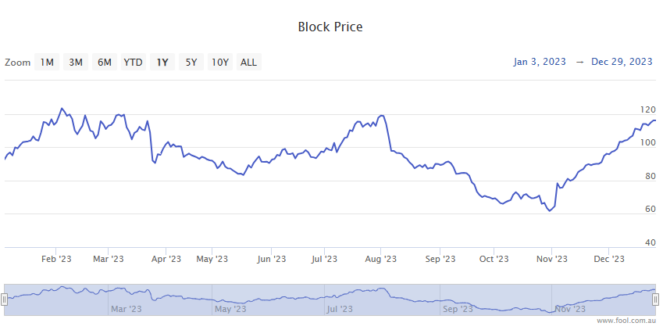The Block Inc (ASX: SQ2) share price is taking a beating today.
Shares in the global S&P/ASX 200 Index (ASX: XJO) buy now, pay later (BNPL) stock – which acquired Afterpay in January 2022 – closed yesterday trading for $113.78. In morning trade on Wednesday, shares are swapping hands for $106.54 apiece, down 6.4%.
For some context, the ASX 200 is down 0.9% at this same time.

Here's what's happening.
Why is the Block share price under pressure?
First, it's worth noting that the Block share price has been on a tear over the past two months.
Before market open this morning the ASX 200 BNPL share had gained a whopping 87.4% since the closing bell rang on 31 October. So, part of the selling we're seeing today will be investors taking some profits off the table.
With that said, a lot of the headwinds hitting the Block share price today appear to be coming from the United States.
Block shares are dual-listed. And the stock closed down 6.6% on the New York Stock Exchange overnight. That came amid a wider sell-off in the US tech sector, which saw the Nasdaq Composite Index (NASDAQ: .IXIC) finish the day down 1.6%.
That selling action was spurred by a pullback in traders' bets that the US Federal Reserve is poised to start cutting interest rates when the board meets on 20 March. Lower odds of a pending rate cut in turn drove US Treasury yields higher overnight.
Commenting on the volatile market dynamics, Oanda market analyst Craig Erlam said (quoted by The Australian Financial Review), "An exceptional end to the year has left markets with a lot to live up to in 2024, with huge rate cuts and a soft landing now among the things investors have priced in."
The Block share price has been rocketing since the end of October on this premise of those huge rat cuts ahead in 2024. High interest rates are difficult for many companies. But they can be particularly onerous to BNPL stocks like Block.
That's partly because higher rates will, over time, see consumers cut down on their spending, which will crimp the company's revenues.
And it's partly because Block is a growth stock, priced with future earnings in mind. And when interest rates rise, the present cost of investing in those future earnings goes up as well.









